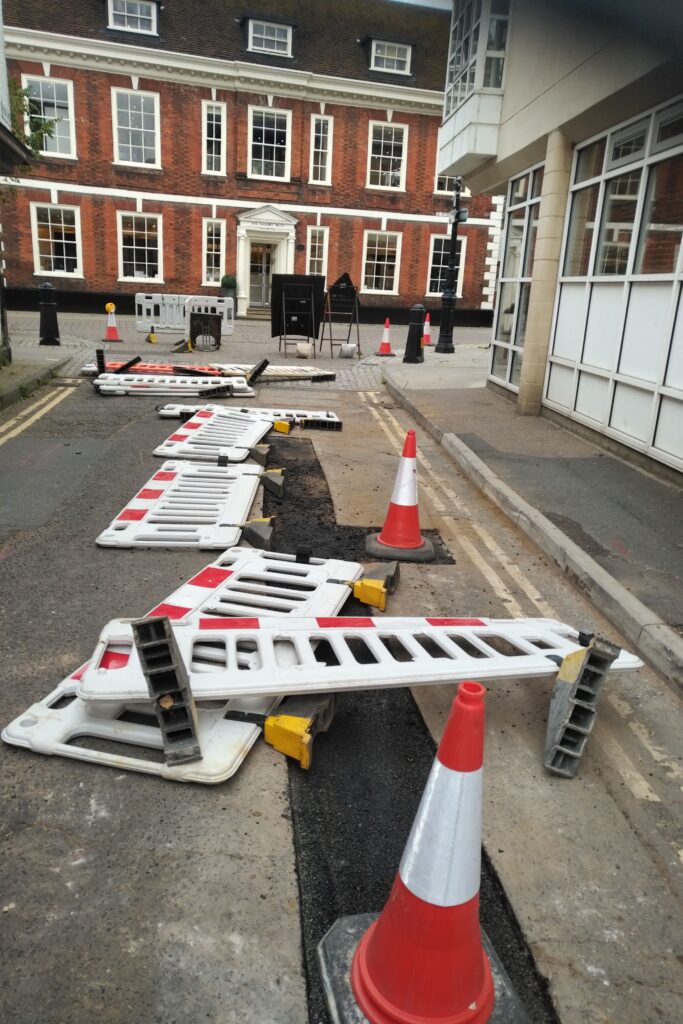In: Streetworks

On the basis of prevention being better than an expensive cure, we thought it worth offering some tips to avoid a trip (real or virtual) to the Magistrates’ Court in 2021 on street works related prosecutions – with its potential adverse reputational and financial consequences.
Our tips are as follows:
- Ensure that your staff and contractor teams understand the requirements that have to be met and are equipped to meet them;
- Robustly audit and monitor compliance of works done by direct labour and contractors;
- Monitor defect reports and FPNs and address any substantive issues that are identified;
- Respond in a timely and effective fashion to any alleged non-compliance that might give rise to a prosecution; and
- Undertake root cause analysis on any problems identified and implement effective change to reduce the risk of re-occurrence.
Applying similar processes, the risks posed by FPNs, s.74 charges and defect inspections fees can also be reduced. Every FPN is a potential criminal prosecution.
If your business has the misfortune to find itself facing criminal prosecution or civil disputes under the New Roads and Street Works Act 1991 and related legislation, our team has extensive experience of advising and training undertakers and their contractors on street works compliance and defending related criminal prosecutions and civil disputes.
Do contact us if you think we can assist in reducing your legal risks from street works.

Whilst there have been very significant increases in street works compliance by utility companies and their contractors over the years, the financial and reputational risks posed to utility companies by certain street works related criminal offences has dramatically increased in recent years. This is as a result of the “uncapping” of level 5 offences brought about by the implementation on 12th March 2015 of s.85(1) of the Legal Aid, Sentencing and Punishment of Offenders Act 2012. For anyone wanting to know the detail, the implementing legislation was the Legal Aid, Sentencing and Punishment of Offenders Act 2012 (Commencement No. 11) Order 2015 (SI 2015/504).
The upshot of “uncapping” is that the previous maximum fine of £5,000 that applied to level 5 fines was removed and the level of fine that the Magistrates’ Court might impose is now effectively unlimited.
Before the “uncapping” of level 5 fines, a bad day in Court on a level 5 capped street works offence was unlikely to prove too financially painful – in the greater scheme of things. That is no longer the case. A bad day in Court on something that 5 years ago might have attracted a £3,000 fine might today see a utility company be sentenced to a considerably larger fine. Whilst it has taken a few years for fines to increase, fine ‘inflation’ has been significant in some parts of the country for even relatively minor non-compliances.
There are steps that an undertaker can take to mitigate the risks that its street work activities may pose. These include:
- Ensuring that all internal and contractor staff have an appropriate understanding of the legal obligations that street works legislation imposes;
- Self auditing of works being done by you and on your behalf and ensuring all non-compliances are promptly identified and rectified; and
- Responding promptly and effectively to any report of problems with a site or works.
Our team has extensive experience of advising undertakers on street works compliance and defending related criminal prosecutions.
Do contact us if you think we can assist in reducing your legal risks from street works.
02/01/2020
S. 50 street work licences

Growth in the multi utility provider sector has created a situation that the original drafters of the s.50 of the New Roads and Street Works Act 1991(“NRSWA”) possibly did not envisage.
This possible stretching of the original drafting does create potential issues for multi utility and other providers when seeking to install apparatus in the street where that apparatus is not being installed under an existing statutory right. It can also create issues where a multi utility provider does hold a statutory right to install one supply. The holding of a statutory right in respect of, say, gas as an Independent Gas Transporter will not, of itself, provide a statutory right to install water, electricity or telecoms apparatus.
Unlike a party with a statutory right to install apparatus in the street, a party wishing to install utility apparatus in the street who does not hold that right is left having to secure a s.50 licence from the street authority.
The most frequently encountered problem by parties seeking s.50 licences are the terms demanded by the street authority. The cause of this is that there is not a right to a s.50 licence. S.50(1) of NRSWA confers a discretion on a street authority as to whether it grants a s.50 licence by its use of the wording “The street authority may grant a licence…..” (our emphasis added).
That discretion is not an absolute one. Like all authority decision making, the discretion must be exercised reasonably. Any unreasonable exercise of the discretion by a street authority may leave the authority open to Judicial Review.
We advise multi utility providers on s.50 licence issues. We also challenge authority decision making processes where that is the appropriate course of action.
Contact us if you would like to discuss how we might assist you in respect of s.50 licences.

Being as keen on bacon sarnies as the next person and also seeing the real benefit of seeking to resolve disputes at an early stage, we take no issue with sorting out disputes over a bacon sarnie. Likewise, if your tastes run to chocolate biscuits with settlement discussions, we’re still completely on side. We’ll add the dull (but necessary) caveat about gifts and hospitality policies being complied with in terms of who is giving/receiving what.
One thing we are less certain of is whether all such discussions set off on the firmest of footings – particularly in respect of the legitimacy of the charges being discussed.
It’s obviously a great result for the paying party if they manage to successfully negotiate a claim down to a fraction of its original value. If however there was no legitimate charge there in the first place but you have agreed to paying 10% of the claimed charge, it may look less of a deal.
Placed in the context of low margins in the sector and those margins potentially getting smaller the further down the contractual chain one goes, a £10,000 payout on a s.74 charge could seriously dent the financial viability of the ultimate paying party. It’s obviously a great result if the charge is legitimately payable but has been successfully negotiated down. It’s a less great result if that charge should never have been accepted in the first place – even if it was successfully negotiated down.
Bearing in mind the significant sums that might fall to be decided over the bacon sarnies, we think there is real merit to going through all the individual charges with the proverbial fine tooth comb. If a proportion of them can be booted into touch before the bacon sarnies invite gets sent or the choccie biscuits bought, the base line for settlement discussions might significantly change.
From our own experience of advising on prolonged occupation charges, one of the key issues is the timely collation of factual information about the job in question relevant to how and why a job may have taken the time that it did. Collating that information as the job progresses so that it is all immediately accessible 12 months later when people are actually looking seriously at the charge makes things far easier than for the person charged with dealing with the dispute having to try to piece together what went on and why. Having all that information to hand may make the difference between nothing being paid out and several thousand being paid.
That a street authority may want you to pay them several thousand pounds for something they perceive to be a prolonged occupation meriting a charge, doesn’t necessarily mean that you owe them anything. Starting off with all of the relevant information to hand will provide considerably greater certainty of what sums may be owed and what a deal looks like.
Knowing that one has all relevant information before going into a meeting with the street authority will enable the person meant to be cutting the deal to concentrate on the key question for the meeting.
And, as we all know, that key question is whether to opt for brown sauce or ketchup.
We advise various energy and utility companies on the validity of s.74 prolonged occupation charges and challenges to such charges.
Contact us if we can assist you with any prolonged occupation charge issues you are encountering.